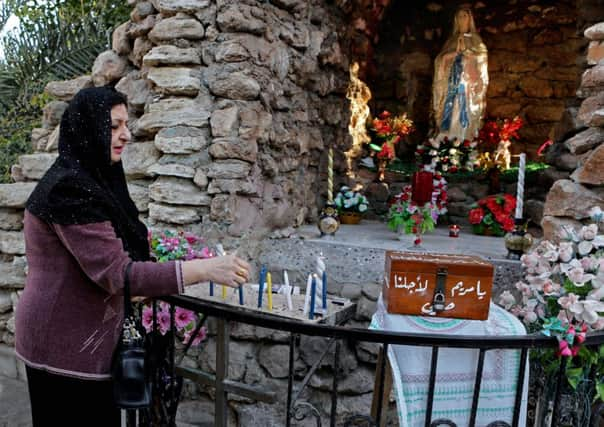George Kerevan: Goodwill to Christian minorities


It was a normal Christmas in Iraq – normal by today’s standards. Some 38 people were murdered in three separate bombings in Christian areas of Baghdad. One car bomb exploded exactly as worshippers were leaving a church service. Christianity was born in the Middle East two millennia ago. But in 2013, for the first time in 2,000 years, Christians are an endangered species in the land where their religion saw the light of day.
You don’t have to be a practising Christian to observe – and worry about – the ethnic and cultural cleansing of Christians going on throughout the Middle East. In September, senior Christian clerics representing a dozen local denominations met in Amman for a conference on the crisis organised by Jordan’s King Abdullah. To underscore the conference agenda, two important prelates from Aleppo failed to make the meeting: Gregorios Yohanna Ibrahim, the Syriac Orthodox bishop, and Boulos Yazigi, his Greek Orthodox counterpart. Both had been abducted, probably by Chechen extremists fighting the Assad regime.
Advertisement
Hide AdAdvertisement
Hide AdUntil the First World War, the area bounded by North Africa, the Middle East and Central Asia used to be multicultural, multi-ethnic and multi-religious.
This should not surprise us. Before the 20th century, religious strife may have been common but it was rarely practised on an industrial scale and then only for brief periods. Communities usually shared the same language and the same agricultural economy. Intermarriage may have been rare but different faith groups and ethnic communities lived side by side – Christians, Jews and Muslims. Because Christians and Jews were indigenous long before the Arab and Turkish invasions of later centuries, those groups retained an important foothold, culturally and economically. The Turkish Ottoman empire accepted all these divergent communities the better to stabilise its shaky rule.
Then came the 20th century. After the First World War, western colonialism in the Middle East favoured Christian communities, and humiliated the Arab population. Initially, the Arab resistance to colonialism was secular, Marxist and non-sectarian. But when pan-Arab socialism imploded in dictatorship, economic incompetence and petty corruption, it was replaced by a new brand of Muslim Sunni fundamentalism funded from Saudi Arabia. The West’s recent cack-handed intervention in Iraq only served to fuel and legitimise this fundamentalist wave. Equally, the West’s misreading of the Sunni Arab Spring has only made matters worse.
The age-old Christian communities in the Middle East have been caught in the crossfire. Sunni fundamentalists – crudely educated young men manipulated by political forces outside their ken – see Christians as western agents. The poverty-stricken Arab masses, whose birth rate in recent decades has far outstripped that of the richer Christian communities, distrust their Christian neighbours for being allies of the secular dictators. Naïve western liberals – historically ignorant about the Middle East and with a guilty conscience after the Iraq invasion – happily ignore the plight of the area’s indigenous Christian population.
Unfortunately, western understanding of the crisis is fostered by our ignorance of the bewildering variety of indigenous Christian denominations in the Middle East. For instance, in Iraq there is the Assyrian Church of the East, the Chaldean Catholic Church, the Syriac Orthodox Church, the Syriac Catholic Church and the Armenian Church. But their plight is dire for all that. In Iraq, which had a Christian population of around 1.2 million in the 1990s, only a few hundred thousand remain to brave the daily bombings and only 57 churches remain standing.
Even in Egypt, where the Copts constitute 10 per cent of the population, thousands of Christians have emigrated since the Arab Spring. If anything, the exodus has increased since Muslim Brotherhood president Mohamed Morsi was deposed in July. The Brotherhood blames Coptic Orthodox Pope Tawadros II for backing the military coup that ousted Morsi – though in truth most urban Egyptians were in favour of ending the Brotherhood’s increasingly fundamentalist rule.
Why should we care in secular Britain? Hundreds of thousands of Muslim Arabs have been killed in the Middle East in the past decade, some will argue. Surely Christians are only a footnote in a greater tragedy. And are their leaders not a little complicit by having sided with Assad, Saddam Hussein and the other dictators?
I do not ignore the totality of the human disaster that is the modern Middle East – far less do I seek to evade western responsibility. However, the issue of the ethnic cleansing of Christians in the Middle East is far from being a footnote, nor is it special pleading. What we are seeing is the planned destruction of a multi-culturalism that has defined the Middle East for 2,000 years and more.
Advertisement
Hide AdAdvertisement
Hide AdIt also adds to the erosion of a traditional, tolerant version of Islam that accepted and embraced this multiculturalism. As for Christians “supporting” Arab dictatorships, these regimes were characterised more by their secular nationalism than their authoritarianism (which is endemic in the Middle East).
It is not something “alien” that is being expelled from the Middle East. Rather it is the devouring of a Christian people and culture that is intrinsic to the land and its history.
Destroying and uprooting their native Christian populations will make it harder for the nations in the area to build sustainable communities, relieve poverty and find peace. Above all, if the Islamists can expel the native Christians, what will they consider doing to Israel?
I am an atheist. But I feel that the destruction of Christianity in the Middle East is everyone’s loss – culturally and politically.
Letting it happen is yet another chapter in the West’s sorry inability to understand the area and its different peoples.